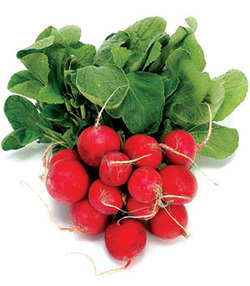31 Days of Raw: Day #26 RadishesI usually only enjoy radishes in salads, so after researching for this article, I've decided to start finding more ways to use them. Holy moly, these little root veggies are incredible! I had no idea! They are relatively inexpensive as well, so they may begin to take the place of other root veggies I use that are a bit more expensive. I can’t wait to try a “stir fry” using radishes…I’ll let you all know how it goes.  Radishes Jaundice: Radish is very good for the liver and the stomach and it is a very good detoxifier too, that is, it purifies blood. It is miraculously useful in jaundice as it helps removing bilirubin and also checks its production. It also checks destruction of red blood cells during jaundice by increasing supply of fresh oxygen in the blood. The black radish is more preferred in jaundice. The leaves of radish are also very useful in treatment of jaundice. Piles: Radish is very rich in roughage, i.e. indigestible carbohydrates. This facilitates digestion, retains water, cures constipation (one of the main causes for piles) and thus gives relief in piles. Being a very good detoxifier, it helps heal up piles fast. Its juice also soothes the digestive and excretory system and this also relieves piles. Urinary Disorders: Radishes are diurectic in nature, i.e. increase production of urine. Juice of radish also cures inflammation and burning feeling during urinating. It also cleans the kidneys and inhibits infections in kidneys and urinary system. Thus it helps a great deal in curing urinary disorders. Weight Loss: Radishes are very filling, i.e. fills your stomach and satisfies your hunger easily without giving you many calories, as they are low in digestible carbohydrates, high in roughage and contain a lot of water. It is a very good dietary option for those determined to lose weight. Leucoderma: The detoxifying and anti carcinogenic properties of radish make it useful in treatment of Leucoderma. The radish seeds are used in this case. They should be powdered and soaked in vinegar or ginger juice or cows urine and then applied on the white patches. Eating radish also aids treatment of Leucoderma. Skin Disorders: Vitamin-C, phosphorus, zinc and some members of vitamin-B complex, which are present in radish, are good for skin. The water in it helps maintaining moisture of the skin. Smashed raw radish is a very good cleanser and serves as a very efficient face pack. Due to its disinfectant properties, radish also helps cure skin disorders, such as drying up, rashes, cracks etc. and also refreshes it. Kidney Disorders: Being diurectic, cleanser and disinfectant, it helps cure many kidney disorders. Its diurectic properties help wash away the toxins accumulated in the kidneys. Cleansing properties clean kidneys up and lessens accumulation of toxins in the blood, thereby decreasing their concentration in the kidneys. Its disinfectant properties protect the kidneys from any infections too. Thus it is good for overall health of the kidneys. Insect Bites: It has anti pruritic properties and can be used as an effective treatment for insect bites, stings of bees, hornets, wasps etc. Its juice also reduces pain and swelling and soothes the affected area. Fever: It brings down the body temperature and relieves inflammation due to fever. Drink radish juice mixed with black salt. Being a good disinfectant, it also fights infections which cause fever, thereby helping cure it. Respiratory Disorders, Bronchitis and Asthma: Radish is an anti congestive, i.e. it relieves congestion of respiratory system including nose, throat, wind-pipe and lungs, due to cold, infection, allergies and other causes. It is a good disinfectant and also rich in vitamins, which protect respiratory system from infections. Liver & Gallbladder: Radish is especially beneficial for liver and gallbladder functions. It regulates production and flow of bile and bilirubin, acids, enzymes and removes excess bilirubin from the blood, being a good detoxifier. It also contains enzymes like myrosinase, diastase, amylase and esterase. It protects liver and gallbladder from infections and ulcers and soothes them. Cholesterol Reduction Studies have shown that radish root could be effective in lowering cholesterol levels. Blood Pressure Radishes are high in potassium which is helpful in regulating blood pressure. High blood pressure is positively associated with higher sodium intake and inversely associated with potassium, calcium, and magnesium intakes. Decrease of sodium and increase of potassium, calcium, and magnesium intakes, which are characteristic of the DASH diet (Dietary Approaches to Stop Hypertension), has an excellent blood pressure lowering effect. Salt restriction, alcohol moderation, weight loss, exercise, and a DASH diet can achieve decreases in systolic blood pressure of approximately 10 to 15 mm Hg when applied together. Decreased intakes of sodium alone, and increased intakes of potassium, calcium, and magnesium each alone decrease high blood pressure. Liver and Digestive Support Black radish root has been used in folk medicine since antiquity as a natural drug for the stimulation of bile function. Radishes contain a variety of sulfur-based chemicals that increase the flow of bile, thus helping to maintain a healthy gallbladder and liver and improving digestion. Radish leaf extract is reported to be beneficial gastrointestinal activities, and is known worldwide for its laxative properties. The leaves of the radish are a well-known home remedy for jaundice, but as yet there is no research to confirm their effectiveness as a treatment for jaundice. Cancer Prevention The radish belongs to the brassica group of vegetables, which include cabbage, brussels sprouts, cauliflower and broccoli. Numerous studies suggest that brassica vegetables are protective against cancers of the lungs and alimentary tract. Brassica or cruciferous vegetables appear to reduce the risk of some cancers perhaps by preventing the formation of carcinogens in your body or by blocking cancer-causing substances from reaching or reacting with sensitive body tissues or by inhibiting the transformation of healthy cells to malignant ones. Cruciferous vegetables all contain sulforaphane, a member of a family of chemicals known as isothiocyanates. In experiments with laboratory rats, sulforaphane appears to increase the body’s production of phase-2 enzymes, naturally occurring substances that inactivate and help eliminate carcinogens. At the Johns Hopkins University in Baltimore, 69 percent of the rats injected with a chemical known to cause mammary cancer developed tumors vs. only 26 percent of the rats given the carcinogenic chemical plus sulforaphane. Cruciferous vegetables are the dietary source of glucosinolates, organic compounds that give brassica vegetables their flavor. The chemo preventive potential of radishes is partly due to their glucosinolates content, and a study in Italy has shown the Japanese daikon to demonstrate anti-cancer activity toward three human colon carcinoma cell lines.
0 Comments
Leave a Reply. |
About the BloggerHaley is passionate about Raw Food and how God has used it to heal her. She loves to share what she knows with anyone who is curious, and finds herself talking to everyone around her about her lifestyle. Archives
January 2020
Categories
All
|

 RSS Feed
RSS Feed